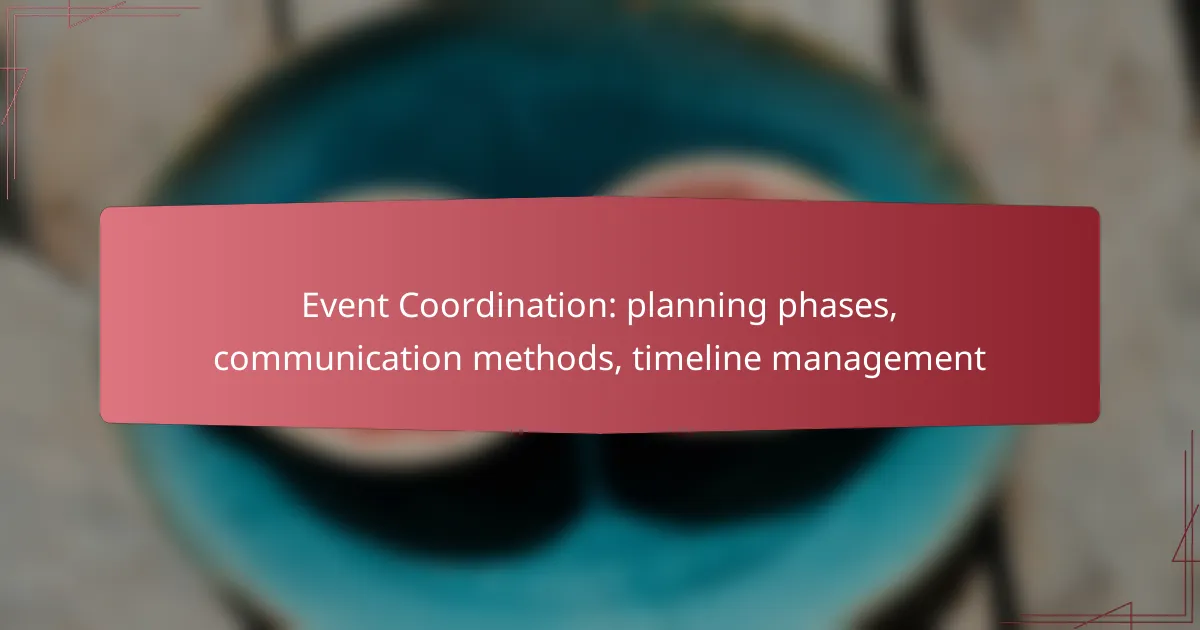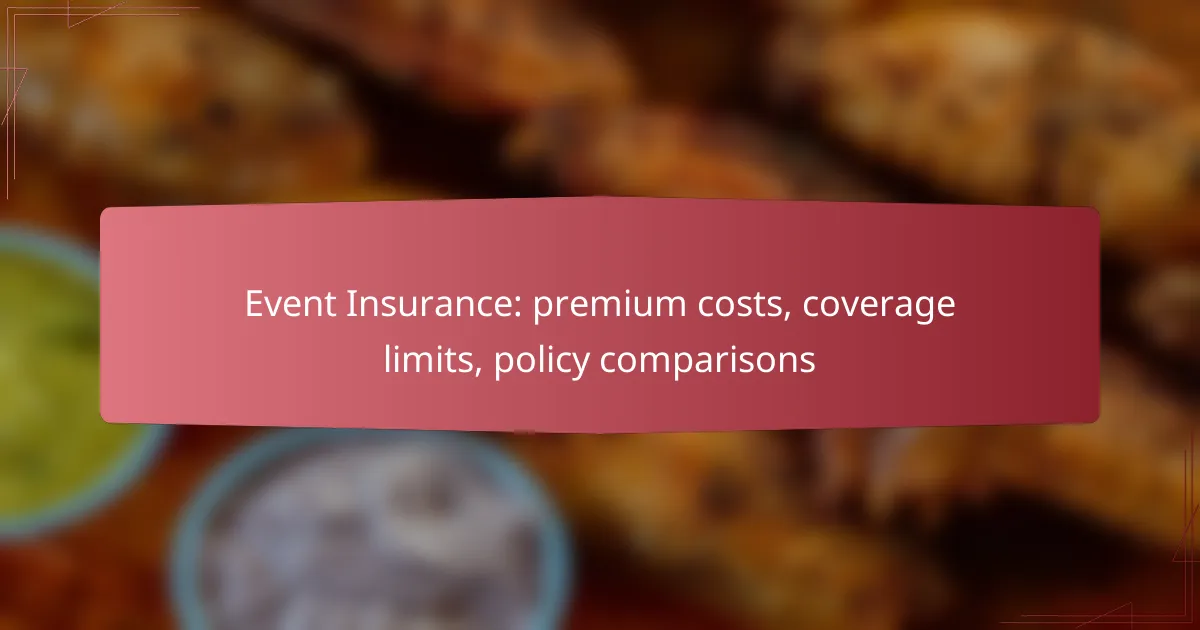Event coordination is a multifaceted process that involves several critical phases, such as defining objectives, selecting venues, and managing budgets. Effective communication is essential throughout this journey, ensuring that all team members are aligned and informed. A well-structured timeline helps guide the planning process, allowing for meticulous attention to detail as the event approaches.

How to plan an event in London?
Planning an event in London involves several key phases, including defining objectives, selecting a venue, creating a budget, and assembling a team. Each phase requires careful consideration to ensure the event meets its goals and runs smoothly.
Define event objectives
Clearly defining event objectives is crucial for guiding all subsequent planning steps. Objectives might include raising funds, increasing brand awareness, or fostering networking opportunities.
Consider using the SMART criteria—Specific, Measurable, Achievable, Relevant, and Time-bound—to articulate your goals. For example, instead of a vague goal like “increase attendance,” aim for “attract 200 attendees from the tech industry by the end of the event.”
Select a venue
Choosing the right venue in London can significantly impact the event’s success. Factors to consider include location, capacity, accessibility, and amenities. Popular areas like Shoreditch or Southbank offer diverse options but may come with higher costs.
Visit potential venues to assess their suitability and ensure they align with your event objectives. Make sure to check for any necessary permits or regulations that may apply, especially for outdoor events.
Create a budget
Establishing a budget is essential for effective event planning. Start by listing all potential expenses, including venue rental, catering, entertainment, and marketing. In London, costs can vary widely, so it’s wise to research and compare options.
Include a contingency fund of around 10-15% to cover unexpected costs. Regularly review your budget to ensure you stay on track and adjust as necessary.
Assemble a team
Building a competent team is vital for executing your event successfully. Identify key roles such as event manager, marketing coordinator, and logistics supervisor. Each team member should have clear responsibilities to streamline the planning process.
Consider leveraging local talent or volunteers to reduce costs. Regular team meetings can help maintain communication and ensure everyone is aligned with the event objectives and timeline.
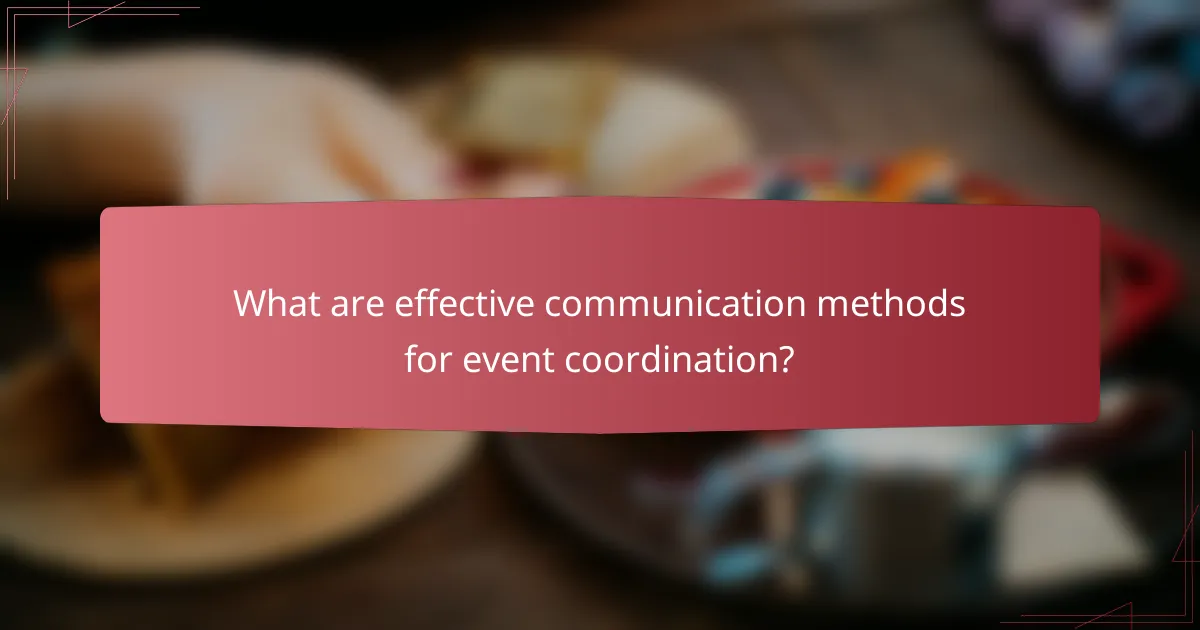
What are effective communication methods for event coordination?
Effective communication methods for event coordination include clear and consistent channels that keep all team members informed and engaged. Utilizing various tools and strategies can enhance collaboration and ensure that everyone is aligned with the event’s goals and timelines.
Email updates
Email updates are a fundamental communication method for event coordination, allowing for detailed information sharing. Regularly scheduled updates can keep team members informed about progress, changes, and upcoming deadlines.
To maximize effectiveness, structure emails with clear subject lines, bullet points for key information, and action items highlighted. Aim to send updates weekly or bi-weekly, depending on the event’s complexity.
Project management tools
Project management tools streamline communication by providing a centralized platform for task assignments, deadlines, and progress tracking. Popular tools like Trello, Asana, or Monday.com can help teams visualize their workload and collaborate efficiently.
Consider using features such as shared calendars, file attachments, and comment sections to enhance interaction. Ensure all team members are trained on the chosen tool to avoid confusion and maximize its benefits.
Regular team meetings
Regular team meetings foster direct communication and allow for real-time feedback and brainstorming. Scheduling weekly or bi-weekly meetings can help address challenges, celebrate milestones, and adjust plans as necessary.
Keep meetings focused by setting a clear agenda and time limits. Encourage participation from all members to ensure diverse perspectives are considered, which can lead to more innovative solutions and a stronger team dynamic.
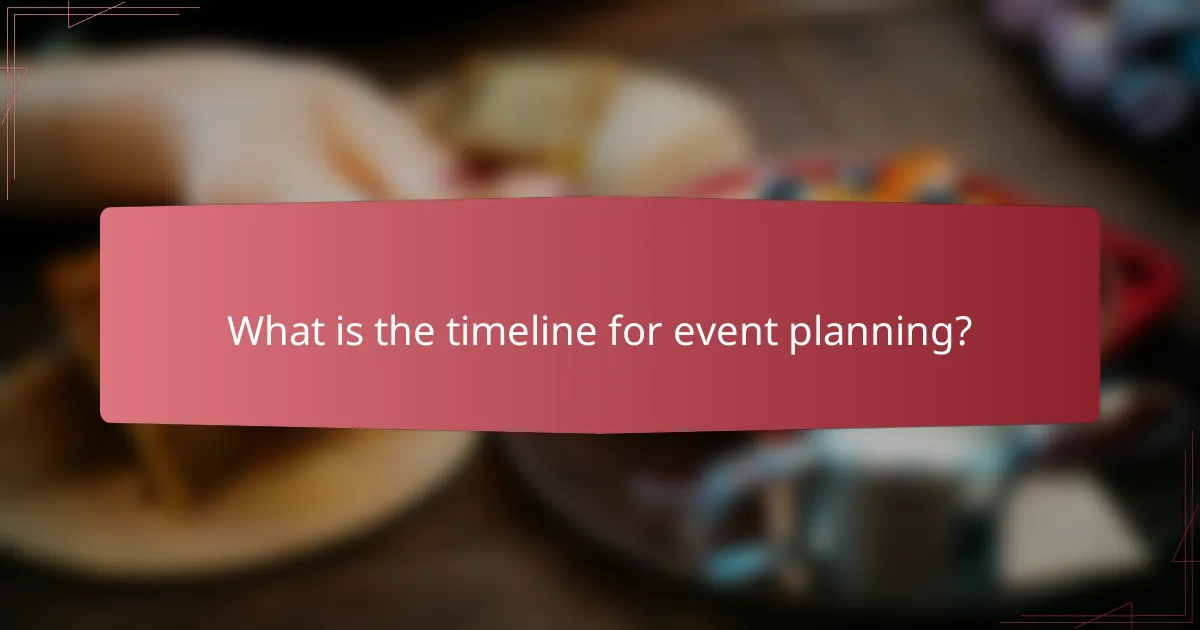
What is the timeline for event planning?
The timeline for event planning typically spans several months, depending on the event’s size and complexity. Key phases include initial planning, vendor selection, and final preparations, each requiring careful attention to detail and effective communication.
Initial planning phase
The initial planning phase is crucial for setting the foundation of the event. During this stage, define the event’s purpose, budget, and target audience. Establishing a clear vision will guide all subsequent decisions.
Consider creating a checklist that includes key tasks such as selecting a date, determining the venue, and outlining the event format. This phase usually occurs 6-12 months prior to the event, allowing ample time for adjustments.
Vendor selection phase
In the vendor selection phase, research and choose suppliers who align with your event’s needs and budget. This includes caterers, audio-visual teams, decorators, and entertainment. Start this process around 4-6 months before the event.
Request proposals and compare them based on cost, services offered, and reviews from previous clients. A well-organized spreadsheet can help track options and make informed decisions.
Final preparations phase
The final preparations phase is where all planning comes together. This phase typically occurs 1-2 months before the event and involves confirming details with vendors, finalizing the guest list, and creating a detailed schedule.
Conduct a walkthrough of the venue to ensure everything is in place and to address any last-minute issues. It’s also beneficial to establish a communication plan for the event day to keep all team members informed and coordinated.
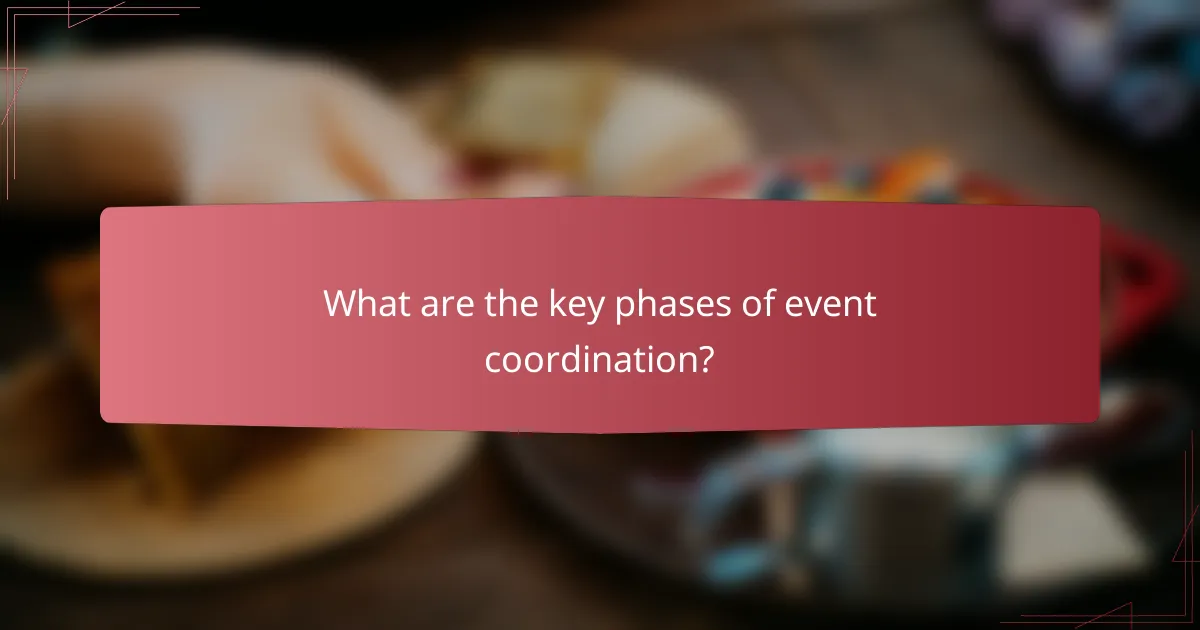
What are the key phases of event coordination?
The key phases of event coordination include pre-event planning, event execution, and post-event evaluation. Each phase plays a crucial role in ensuring the event runs smoothly and achieves its objectives.
Pre-event planning
Pre-event planning involves defining the event’s purpose, setting a budget, and selecting a date and venue. It’s essential to create a detailed timeline that outlines tasks and deadlines to keep the planning process on track.
Consider factors like the target audience, potential speakers, and necessary permits. Engaging stakeholders early can help identify potential challenges and streamline decision-making.
Event execution
Event execution is the phase where all planning comes to life. This includes setting up the venue, managing registrations, and coordinating staff and volunteers to ensure everything runs as planned.
Effective communication is vital during this phase. Utilize tools like walkie-talkies or group messaging apps to keep everyone informed and address issues promptly. Regular check-ins can help maintain momentum and resolve any last-minute challenges.
Post-event evaluation
Post-event evaluation focuses on assessing the event’s success and gathering feedback from attendees and stakeholders. This phase should include analyzing attendance numbers, budget adherence, and overall satisfaction levels.
Consider conducting surveys or feedback sessions to gather insights. Documenting lessons learned can improve future events and help refine your coordination process. Aim to review and report findings within a few weeks of the event to keep the information fresh and actionable.
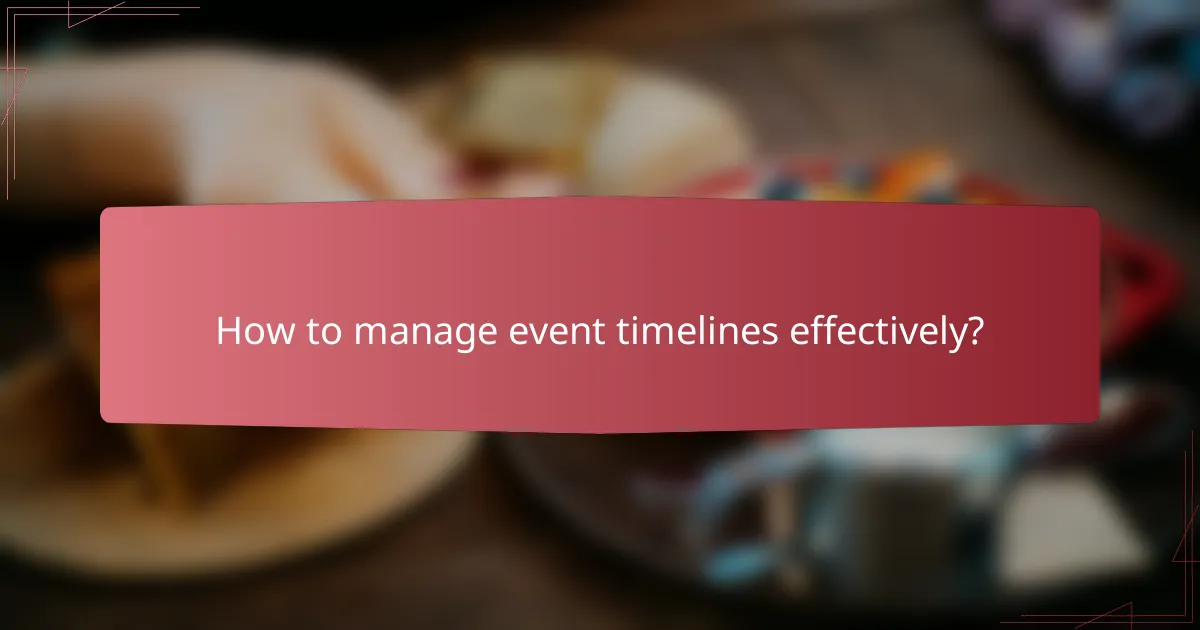
How to manage event timelines effectively?
Effective event timeline management involves creating a structured plan that outlines key tasks and deadlines. By utilizing tools and techniques, you can ensure that all elements of the event are completed on schedule, minimizing last-minute stress and maximizing success.
Use Gantt charts
Gantt charts are visual tools that help you map out the timeline of your event. They display tasks along a timeline, allowing you to see overlaps and dependencies at a glance. This can be particularly useful for identifying critical paths and ensuring that all team members are aligned on deadlines.
To create a Gantt chart, list all tasks, assign start and end dates, and indicate who is responsible for each task. Software options like Microsoft Project or online tools like Trello can simplify this process. Regularly updating the chart will keep everyone informed of progress and changes.
Set deadlines for tasks
Setting clear deadlines for each task is crucial for effective timeline management. Break down the event planning process into manageable tasks and assign realistic due dates. This not only helps in tracking progress but also creates accountability among team members.
Consider using the SMART criteria—Specific, Measurable, Achievable, Relevant, and Time-bound—when establishing deadlines. For instance, instead of saying “send invitations,” specify “send invitations by March 1.” This clarity helps prevent misunderstandings and keeps the planning process on track.
Monitor progress regularly
Regular progress monitoring is essential to ensure that the event timeline stays on track. Schedule weekly or bi-weekly check-ins with your team to discuss completed tasks, upcoming deadlines, and any potential roadblocks. This proactive approach allows for timely adjustments if needed.
Utilize project management tools that provide real-time updates on task completion. Encourage open communication among team members to address issues promptly. By staying engaged with the timeline, you can mitigate risks and ensure a smoother event execution.

What criteria should be considered when selecting vendors?
When selecting vendors, consider their reliability, experience, and alignment with your event’s goals. Evaluating these criteria ensures that you choose partners who can deliver quality services and meet your specific needs.
Reliability and Reputation
Assessing a vendor’s reliability involves checking their track record and client testimonials. Look for reviews, case studies, or references that demonstrate their ability to deliver on promises consistently.
Additionally, consider their reputation within the industry. Vendors with a strong reputation are often more likely to provide quality service and meet deadlines, which is crucial for successful event coordination.
Experience and Expertise
Experience in the specific type of event you are planning is essential. Vendors who specialize in certain events, such as weddings, corporate functions, or festivals, will have tailored knowledge that can enhance your event.
Evaluate their portfolio to see past work and ensure their style aligns with your vision. This can help you gauge their creativity and problem-solving abilities in real-world scenarios.
Cost and Value
While cost is a significant factor, focus on the value provided rather than just the price. Compare quotes from multiple vendors and consider what services are included, such as setup, breakdown, and customer support.
Be wary of vendors offering significantly lower prices, as this may indicate lower quality or hidden costs. Aim for a balance between affordability and the level of service you expect.
Communication and Responsiveness
Effective communication is vital for a smooth planning process. Evaluate how promptly and clearly a vendor responds to inquiries during the selection phase, as this often reflects their overall customer service approach.
Establishing open lines of communication early on can prevent misunderstandings later. Ensure that the vendor is willing to collaborate and adapt to your needs throughout the planning process.
